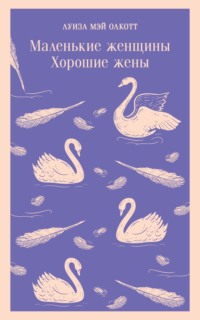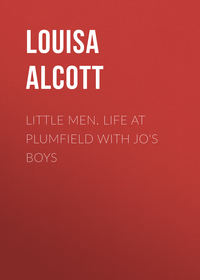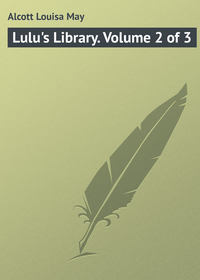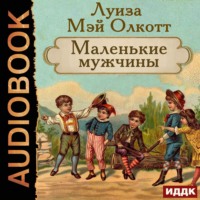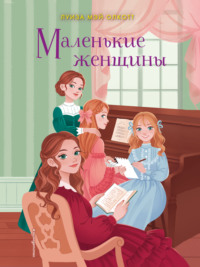 полная версия
полная версияLulu's Library. Volume 3 of 3
"Buy some nice fresh milk for little Totty, and tell her I sent it-all myself-with my love. Come again to-morrow, and I will tell mamma all about you, and you shall be my poor people, and I 'll help you if I can," she said, full of interest and good-will, for the sight of this child made her feel what poverty really was, and long to lighten it if she could.
Lucy was smiling when she went away, snug and dry in her comfortable clothes, with the full basket on her arm; and all that day Lu talked and thought about her "own poor people," and what she hoped to do for them. Mamma inquired, and finding them worthy of help, let her little girl send many comforts to the children, and learn how to be wisely charitable.
"I shall give all my money to my 'Lucy children' on Christmas," announced Lu, as that pleasant time drew near. "I know what they want, and though I can't save money enough to give them half the things they need, maybe I can help a good deal, and really have a nice bundle to s'prise them with."
This idea took possession of little Lu, and she worked like a beaver in all sorts of funny ways to fill her purse by Christmas-time. One thing she did which amused her family very much, though they were obliged to stop it. Lu danced very prettily, and often had what she called ballets before she went to bed, when she tripped about the parlor like a fairy in the gay costumes aunty made for her. As the purse did not fill as fast as she hoped, Lu took it into her head one fine day to go round the square where she lived, with her tambourine, and dance as some of the girls with the hand-organ men did. So she dressed herself in her red skirt and black velvet jacket, and with a fur cap on her head and a blue cloak over her shoulders, slipped out into the quiet square, and going to the farther corner, began to dance and beat her tambourine on the sidewalk before a house where some little children lived.
As she expected, they soon came running to the window, and were charmed to see the pretty dancer whirling to and fro, with her ribbons flying and her tambourine bells ringing, till her breath was gone. Then she held up the instrument and nodded smilingly at them; and they threw down cents wrapped in paper, thinking her music much better than any the organ men made. Much encouraged, Lu went on from house to house, and was doing finely, when one of the ladies who looked out recognized the child, and asked her if her mother knew where she was. Lu had to say "No;" and the lady sent a maid to take her home at once.
That spoiled all the fun; and poor Lu did not hear the last of her prank for a long time. But she had made forty-two cents, and felt comforted when she added that handsome sum to her store. As if to console her for this disappointment, after that day several bright ten-cent pieces got into the red purse in a most mysterious manner. Lu asked every one in the house, and all declared that they did not do it. Grandpa could not get out of his chair without help, and nurse said she never took the purse to him; so of course it could not be he who slipped in those welcome bits of silver. Lu asked him; but he was very deaf that day, and did not seem to understand her at all.
"It must be fairies," she said, pondering over the puzzle, as she counted her treasure and packed it away, for now the little red purse was full. "Aunty says there are no fairies; but I like to think so. Perhaps angels fly around at Christmas-time as they did long ago, and love to help poor people, and put those beautiful bright things here to show that they are pleased with me." She liked that fancy, and aunty agreed that some good spirit must have done it, and was sure they would find out the secret some time.
Lucy came regularly; and Lu always tried to see her, and so learned what she and Totty and Joe and Jimmy wanted, but never dreamed of receiving Christmas morning. It did both little girls much good, for poor Lucy was comforted by the kindness of these friends, and Lu learned about far harder trials than the want of sugarplums. The day before Christmas she went on a grand shopping expedition with aunty, for the purse now held three dollars and seven cents. She had spent some of it for trifles for her "Lucy children," and had not earned as much as she once hoped, various fits of idleness and other more amusing but less profitable work having lessened her wages. But she had enough, thanks to the good spirit, to get toys and books and candy for her family, and went joyfully away Christmas Eve to carry her little basket of gifts, accompanied by aunty with a larger store of comforts for the grateful mother.
When they got back, Lu entertained her mother with an account of the delight of the children, who never had such a Christmas before.
"They could n't wait till morning, and I could n't either, and we opened the bundles right away; and they screamed, mamma, and jumped for joy and ate everything and hugged me. And the mother cried, she was so pleased; and the boys can go to school all neat now, and so could Lucy, only she has to take care of Totty while her mother goes to work. Oh, it was lovely! I felt just like Santa Claus, only he does n't stay to see people enjoy their things, and I did."
Here Lu stopped for breath, and when she got it, had a fine ballet as the only way to work off her excitement at the success of her "s'prise." It was a trial to go to bed, but she went at last, and dreamed that her "Lucy children" all had wings, and were flying round her bed with tambourines full of heavenly bonbons, which they showered down upon her; while aunty in an immense nightcap stood by clapping her hands and saying, "Eat all you like, dear; this sort won't hurt you."
Morning came very soon; and she popped up her head to see a long knobby stocking hanging from the mantel-piece. Out of bed skipped the little white figure, and back again, while cries of joy were heard as the treasures appeared one by one. There was a tableful beside the stocking, and Lu was so busy looking at them that she was late to breakfast. But aunty waited for her, and they went down together some time after the bell rang.
"Let me peep and see if grandpa has found the silk handkerchief and spectacle-case I made for him," whispered Lu, as they passed the parlor door, which stood half open, leaving a wide crack for the blue eyes to spy through.
The old gentleman sat in his easy-chair as usual, waiting while nurse got his breakfast; but what was he doing with his long staff? Lu watched eagerly, and to her great surprise saw him lean forward, and with the hook at the end take the little red purse off the easel, open it, and slip in a small white parcel, then hang it on the gilt peg again, put away the cane, and sit rubbing his hands and laughing to himself at the success of his little trick, quite sure that this was a safe time to play it. Lu was about to cry out, and rush in, but aunty whispered, "Don't spoil his fun yet. Go and see what is in the purse, then thank him in the way he likes best."
So Lu skipped into the parlor, trying to look very innocent, and ran to open the dear red purse, as she often did, eager to see if the good fairy had added to the charity fund.
"Why, here 's a great gold medal, and some queer, shaky writing on the paper. Please see what it is," said Lu, very loud, hoping grandpa would hear her this time, for his face was hidden behind the newspaper he pretended to read.
"For Lu's poor's purse, from Santa Claus," read aunty, glad that at last the kind old fairy was discovered and ready for his reward.
Lu had never seen a twenty-dollar gold-piece before; but she could not stop to find out whether the shining medal was money or a locket, and ran to grandpa, crying as she pulled away the paper and threw her arms about his neck, -
"I 've found you out, I 've found you out, my dear old Santa Claus! Merry Christmas, grandpa, and lots of thanks and kisses!"
It was pretty to see the rosy cheek against the wrinkled one, the golden and the silver heads close together, as the old man and the little girl kissed and laughed, and both talked at once for a few minutes.
"Tell me all about it, you sly grandpa. What made you think of doing it that way, and not let any one know?" cried Lu, as the old gentleman stopped to rest after a kindly "cuddle," as Lu called these caresses.
"Well, dear, I liked to see you trying to do good with your little pennies, and I wanted to help. I 'm a feeble old man, tied to my chair and of no use now; but I like a bit of fun, and love to feel that it is not quite too late to make some one happy."
"Why, grandpa, you do heaps of good, and make many, many people happy," said Lu, with another hug. "Mamma told me all about the hospital for little children you built, and the money you gave to the poor soldiers in the war, and ever so many more good things you 've done. I won't have you say you are of no use now. We want you to love and take care of; and we could n't do without you, could we, aunty?"
Aunty sat on the arm of the chair with her arm round the old man's shoulder, and her only answer was a kiss. But it was enough, and grandpa went on quite cheerfully, as he held two plump hands in his own, and watched the blooming face that looked up at him so eagerly:
"When I was younger, I loved money, and wanted a great deal. I cared for nothing else, and worked hard to get it, and did get it after years of worry. But it cost me my health, and then I saw how foolish I had been, for all my money could not buy me any strength or pleasure and very little comfort. I could not take it with me when I died, and did not know what to do with it, because there was so much. So I tried to see if giving it away would not amuse me, and make me feel better about having wasted my life instead of using it wisely. The more I gave away the better I felt; and now I'm quite jolly, though I'm only a helpless old baby just fit to play jokes and love little girls. You have begun early at this pretty game of give-away, my dear, and aunty will see that you keep it up; so that when you are old you will have much treasure in the other world where the blessings of the poor are more precious than gold and silver."
Nobody spoke for a minute as the feeble old voice stopped; and the sunshine fell on the white head like a blessing. Then Lu said very soberly, as she turned the great coin in her hand, and saw the letters that told its worth, -
"What shall I do with all this money? I never had so much, and I 'd like to spend it in some very good and pleasant way. Can you think of something, aunty, so I can begin at once to be like grandpa?"
"How would you like to pay two dollars a month, so that Totty can go to the Sunnyside Nursery, and be taken care of every day while Lucy goes to school? Then she will be safe and happy, and Lucy be learning, as she longs to do, and the mother free to work," said aunty, glad to have this dear child early learn to help those less blessed than herself.
"Could I? How splendid it would be to pay for a real live baby all myself! How long would my money do it?" said Lu, charmed with the idea of a living dolly to care for.
"All winter, and provide clothes besides. You can make them yourself, and go and see Totty, and call her your baby. This will be a sweet charity for you; and to-day is a good day to begin it, for this is the birthday of the Divine Child, who was born in a poorer place even than Lucy's sister. In His name pity and help this baby, and be sure He will bless you for it."
Lu looked up at the fine picture of the Good Shepherd hanging over the sofa with holly-leaves glistening round it, and felt as if she too in her humble way was about to take a helpless little lamb in her arms and comfort it. Her childish face was very sweet and sober as she said softly, -
"Yes, I will spend my Christmas money so; for, aunty, I do think your sort of sweetie is better than mine, and making people happy a much wiser way to spend my pennies than in buying the nicest candy in the world."
Little Lu remembered that morning long after the dear old grandfather was gone, and kept her Christmas promise so well that very soon a larger purse was needed for charity money, which she used so wisely and so happily. But all her life in one corner of her desk lay carefully folded up, with the bit of paper inside, the little red purse.
VII
SOPHIE'S SECRET
,, class:: center medium
IA party of young girls, in their gay bathing-dresses, were sitting on the beach waiting for the tide to rise a little higher before they enjoyed the daily frolic which they called "mermaiding."
"I wish we could have a clam-bake; but we have n't any clams, and don't know how to cook them if we had. It's such a pity all the boys have gone off on that stupid fishing excursion," said one girl, in a yellow-and-black striped suit which made her look like a wasp.
"What is a clam-bake? I do not know that kind of fête," asked a pretty brown-eyed girl, with an accent that betrayed the foreigner.
The girls laughed at such sad ignorance, and Sophie colored, wishing she had not spoken.
"Poor thing! she has never tasted a clam. What should we do if we went to Switzerland?" said the wasp, who loved to tease.
"We should give you the best we had, and not laugh at your ignorance, if you did not know all our dishes. In my country, we have politeness, though not the clam-bake," answered Sophie, with a flash of the brown eyes which warned naughty Di to desist.
"We might row to the light-house, and have a picnic supper. Our mammas will let us do that alone," suggested Dora from the roof of the bath-house, where she perched like a flamingo.
"That's a good idea," cried Fanny, a slender brown girl who sat dabbling her feet in the water, with her hair streaming in the wind. "Sophie should see that, and get some of the shells she likes so much."
"You are kind to think of me. I shall be glad to have a necklace of the pretty things, as a souvenir of this so charming place and my good friend," answered Sophie, with a grateful look at Fanny, whose many attentions had won the stranger's heart.
"Those boys have n't left us a single boat, so we must dive off the rocks, and that is n't half so nice," said Di, to change the subject, being ashamed of her rudeness.
"A boat is just coming round the Point; perhaps we can hire that, and have some fun," cried Dora, from her perch. "There is only a girl in it; I 'll hail her when she is near enough."
Sophie looked about her to see where thehail was coming from; but the sky was clear, and she waited to see what new meaning this word might have, not daring to ask for fear of another laugh.
While the girls watched the boat float around the farther horn of the crescent-shaped beach, we shall have time to say a few words about our little heroine.
She was a sixteen-year-old Swiss girl, on a visit to some American friends, and had come to the seaside for a month with one of them who was an invalid. This left Sophie to the tender mercies of the young people; and they gladly welcomed the pretty creature, with her fine manners, foreign ways, and many accomplishments. But she had a quick temper, a funny little accent, and dressed so very plainly that the girls could not resist criticising and teasing her in a way that seemed very ill-bred and unkind to the new-comer.
Their free and easy ways astonished her, their curious language bewildered her; and their ignorance of many things she had been taught made her wonder at the American education she had heard so much praised. All had studied French and German; yet few read or spoke either tongue correctly, or understood her easily when she tried to talk to them. Their music did not amount to much, and in the games they played, their want of useful information amazed Sophie. One did not know the signs of the zodiac; another could only say of cotton that "it was stuff that grew down South;" and a third was not sure whether a frog was an animal or a reptile, while the handwriting and spelling displayed on these occasions left much to be desired. Yet all were fifteen or sixteen, and would soon leave school "finished," as they expressed it, but not furnished, as they should have been, with a solid, sensible education. Dress was an all-absorbing topic, sweetmeats their delight; and in confidential moments sweethearts were discussed with great freedom. Fathers were conveniences, mothers comforters, brothers plagues, and sisters ornaments or playthings according to their ages. They were not hard-hearted girls, only frivolous, idle, and fond of fun; and poor little Sophie amused them immensely till they learned to admire, love, and respect her.
Coming straight from Paris, they expected to find that her trunks contained the latest fashions for demoiselles, and begged to see her dresses with girlish interest. But when Sophie obligingly showed a few simple, but pretty and appropriate gowns and hats, they exclaimed with one voice, -
"Why, you dress like a little girl! Don't you have ruffles and lace on your dresses; and silks and high-heeled boots and long gloves and bustles and corsets, and things like ours?"
"I am a little girl," laughed Sophie, hardly understanding their dismay. "What should I do with fine toilets at school? My sisters go to balls in silk and lace; but I-not yet."
"How queer! Is your father poor?" asked Di, with Yankee bluntness.
"We have enough," answered Sophie, slightly knitting her dark brows.
"How many servants do you keep?"
"But five, now that the little ones are grown up."
"Have you a piano?" continued undaunted Di, while the others affected to be looking at the books and pictures strewn about by the hasty unpacking.
"We have two pianos, four violins, three flutes, and an organ. We love music, and all play, from papa to little Franz."
"My gracious, how swell! You must live in a big house to hold all that and eight brothers and sisters."
"We are not peasants; we do not live in a hut. Voilà, this is my home." And Sophie laid before them a fine photograph of a large and elegant house on lovely Lake Geneva.
It was droll to see the change in the faces of the girls as they looked, admired, and slyly nudged one another, enjoying saucy Di's astonishment, for she had stoutly insisted that the Swiss girl was a poor relation.
Sophie meanwhile was folding up her plain piqué and muslin frocks, with a glimmer of mirthful satisfaction in her eyes, and a tender pride in the work of loving hands now far away.
Kind Fanny saw a little quiver of the lips as she smoothed the blue corn-flowers in the best hat, and put her arm around Sophie, whispering, -
"Never mind, dear, they don't mean to be rude; it's only our Yankee way of asking questions. I like all your things, and that hat is perfectly lovely."
"Indeed, yes! Dear mamma arranged it for me. I was thinking of her and longing for my morning kiss."
"Do you do that every day?" asked Fanny, forgetting herself in her sympathetic interest.
"Surely, yes. Papa and mamma sit always on the sofa, and we all have the hand-shake and the embrace each day before our morning coffee. I do not see that here," answered Sophie, who sorely missed the affectionate respect foreign children give their parents.
"Have n't time," said Fanny, smiling too, at the idea of American parents sitting still for five minutes in the busiest part of the busy day to kiss their sons and daughters.
"It is what you call old-fashioned, but a sweet fashion to me; and since I have not the dear warm cheeks to kiss, I embrace my pictures often. See, I have them all." And Sophie unfolded a Russia-leather case, displaying with pride a long row of handsome brothers and sisters with the parents in the midst.
More exclamations from the girls, and increased interest in "Wilhelmina Tell," as they christened the loyal Swiss maiden, who was now accepted as a companion, and soon became a favorite with old and young.
They could not resist teasing her, however, – her mistakes were so amusing, her little flashes of temper so dramatic, and her tongue so quick to give a sharp or witty answer when the new language did not perplex her. But Fanny always took her part, and helped her in many ways. Now they sat together on the rock, a pretty pair of mermaids with wind-tossed hair, wave-washed feet, and eyes fixed on the approaching boat.
The girl who sat in it was a great contrast to the gay creatures grouped so picturesquely on the shore, for the old straw hat shaded a very anxious face, the brown calico gown covered a heart full of hopes and fears, and the boat that drifted so slowly with the incoming tide carried Tilly Reed like a young Columbus toward the new world she longed for, believed in, and was resolved to discover.
It was a weather-beaten little boat, yet very pretty; for a pile of nets lay at one end, a creel of red lobsters at the other, and all between stood baskets of berries and water-lilies, purple marsh rosemary and orange butterfly-weed, shells and great smooth stones such as artists like to paint little sea-views on. A tame gull perched on the prow; and the morning sunshine glittered from the blue water to the bluer sky.
"Oh, how pretty! Come on, please, and sell us some lilies," cried Dora, and roused Tilly from her waking dream.
Pushing back her hat, she saw the girls beckoning, felt that the critical moment had come, and catching up her oars, rowed bravely on, though her cheeks reddened and her heart beat, for this venture was her last hope, and on its success depended the desire of her life. As the boat approached, the watchers forgot its cargo to look with surprise and pleasure at its rower, for she was not the rough country lass they expected to see, but a really splendid girl of fifteen, tall, broad-shouldered, bright-eyed, and blooming, with a certain shy dignity of her own and a very sweet smile, as she nodded and pulled in with strong, steady strokes. Before they could offer help, she had risen, planted an oar in the water, and leaping to the shore, pulled her boat high up on the beach, offering her wares with wistful eyes and a very expressive wave of both brown hands.
"Everything is for sale, if you 'll buy," said she.
Charmed with the novelty of this little adventure, the girls, after scampering to the bathing-houses for purses and portemonnaies, crowded around the boat like butterflies about a thistle, all eager to buy, and to discover who this bonny fisher-maiden might be.
"Oh, see these beauties!" "A dozen lilies for me!" "All the yellow flowers for me, they'll be so becoming at the dance to-night!" "Ow! that lob bites awfully!" "Where do you come from?" "Why have we never seen you before?"
These were some of the exclamations and questions showered upon Tilly, as she filled little birch-bark panniers with berries, dealt out flowers, or dispensed handfuls of shells. Her eyes shone, her cheeks glowed, and her heart danced in her bosom; for this was a better beginning than she had dared to hope for, and as the dimes tinkled into the tin pail she used for her till, it was the sweetest music she had ever heard. This hearty welcome banished her shyness; and in these eager, girlish customers she found it easy to confide.
"I 'm from the light-house. You have never seen me because I never came before, except with fish for the hotel. But I mean to come every day, if folks will buy my things, for I want to make some money, and this is the only way in which I can do it."
Sophie glanced at the old hat and worn shoes of the speaker, and dropping a bright half-dollar into the pail, said in her pretty way:
"For me all these lovely shells. I will make necklaces of them for my people at home as souvenirs of this charming place. If you will bring me more, I shall be much grateful to you."
"Oh, thank you! I 'll bring heaps; I know where to find beauties in places where other folks can't go. Please take these; you paid too much for the shells;" and quick to feel the kindness of the stranger, Tilly put into her hands a little bark canoe heaped with red raspberries.
Not to be outdone by the foreigner, the other girls emptied their purses and Tilly's boat also of all but the lobsters, which were ordered for the hotel.
"Is that jolly bird for sale?" asked Di, as the last berry vanished, pointing to the gull who was swimming near them while the chatter went on.
"If you can catch him," laughed Tilly, whose spirits were now the gayest of the party.



